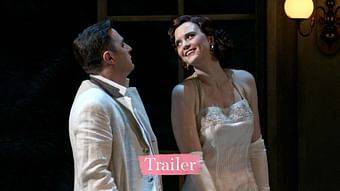A rich countess and a fictitious fiancé who suddenly appears at the door. An impoverished count who, as a steward on the countess's estate, wants to earn the dowry for his sister. A web of false assumptions. Emmerich Kálmán's operetta shows a world in upheaval in which everyone is looking for their place, but he creates music full of life and melancholy for it. Thomas Enzinger's production tells the story in retrospect: A society remembering better times ...
The composer Emmerich Kálmán provided Vienna with three immortal operetta hits and music that still excites today: The Csárdás Princess, Gräfin Mariza (1924) and Zirkusprinzessin (1926).
Act 1: The country estates belonging to Countess Maritza have a new manager. He goes by the name of Béla Török but is really the impoverished Count Tassilo Endrödy-Wittemburg. Tassilo intends to work as estate manager until he has saved up a dowry for his sister Lisa, who is not supposed to know anything about the financial ruin that has fallen upon the family. In order to cover the debts, Tassilo has instructed his friend Karl Stephan Liebenberg to sell everything the Endrödy-Wittemburg family possesses. Liebenberg sends Tassilo a message saying that the sale has been completed.
Following a lengthy period of absence, Maritza announces that she is paying a visit to her country estates. She has invited a large number of guests (including her longstanding admirer Prince Populescu) to celebrate the announcement of her betrothal to a certain Koloman Zsupán. However, as Maritza states to general astonishment, the bridegroom will not be present at the betrothal party. In fact she has simply invented a bridegroom for herself (and given him the name of a character in an operetta!) in order to fend off tiresome admirers.
Tassilo introduces himself as the new estate manager, and is treated with great condescension by Maritza. To his surprise he finds himself face to face with his sister Lisa, who has arrived in Maritza’s retinue. Tassilo allows Lisa to believe that he has taken on the job of estate manager because of a woman, and asks her to keep his true identity a secret.
To everyone’s surprise, a Baron Koloman Zsupán appears in order to get to know his future bride, and persistently asks her to “Come with me to Varašdin!”
The guests celebrate boisterously, while Tassilo, who has not been invited to join them, sadly thinks back to former times. When he refuses to sing his song again for Maritza, she abruptly dismisses him. This does nothing to dampen the celebratory mood among the guests, who decide to set off for the town to visit the cabaret.
The gypsy woman Manja foretells that within four weeks Maritza will fall in love with a man of noble origin. Maritza does not go with the others to the cabaret. After all the guests have departed, she and Tassilo get to know each other better. Maritza does not want to lose her estate manager, and she revokes her dismissal.
Act 2: The four weeks have passed. Lisa has fallen in love with Zsupán, although he talks only of his love for Countess Maritza. Finally Zsupán confesses his feelings for Lisa. And the Countess is increasingly attracted to her new estate manager, although in her dreams she is still pursued by other admirers …
Prince Populescu wants to know if he is the fortunate man with whom Maritza has fallen in love, but she again refuses to go with him to the cabaret. Populescu will go to any cost and any trouble to bring the cabaret to Maritza. And he sows the seeds of doubt in Maritza’s heart, which she has long ago given to her estate manager: from an intercepted letter from Tassilo to Liebenberg it is clear that Tassilo is a nobleman in financial difficulties; Populescu also assumes that Tassilo and Lisa are secretly in love.
In front of the assembled company Maritza reveals Tassilo’s true identity. She accuses him of insinuating his way into her life as a dowry-hunter, and throws a large sum of money before him. Then Lisa reveals herself as Tassilo’s sister. In her heart, Maritza is relieved – but the break with Tassilo seems to be irreparable.
Act 3: After a night on the town, Populescu confesses to his drinking companion Zsupán that he is still eternally in love with a princess whom he has not seen for years.
Tassilo’s aunt, Princess Božena, unexpectedly appears, accompanied by her manservant Penižek. She has bought back Tassilo’s inheritance and has also sought out a bride for him, whom her nephew rejects. Talking to Maritza, Božena discovers that she loves Tassilo and bitterly regrets the way she has behaved.
Zsupán reveals himself as an impostor, but Lisa decides to stay with him. Prince Populescu recognises in Božena the woman he loved in his youth. Preparations are made for a double wedding … and Maritza and Tassilo also finally confess their love for each other.
Cast
- Conductor
- Karsten Januschke
- Stage direction
- Thomas Enzinger
- Stage and costume design
- Toto
- Choreography
- Bohdana Szivacz
- Lighting design
- Sabine Wiesenbauer
- Choir director
- Holger Kristen
- Gräfin Mariza
- Caroline Melzer
- Fürst Populescu
- Toni Slama
- Baron Koloman Zsupán
- Jakob Semotan
- Graf Tassilo
- Carsten Süss
- Lisa, seine Schwester
- Juliette Khalil
- Karl Stephan Liebenberg
- Nicolaus Hagg
- Fürstin Božena
- Helga Papouschek
- Penižek, ihr Kammerdiener
- Robert Meyer
- Tschekko, ein Diener
- Franz Suhrada
- Manja, eine Zigeunerin
- Annely Peebo
- Primas
- Gregory Rogers
- Ein Mädchen
- Emma Westerkamp
- Musik
- Emmerich Kálmán
Photos and Videos
For all those who use a screen reader, a description of the visual aspects of the performance (set design, costumes...) follows here instead of the photo gallery.

.jpg)
.jpg)
.jpg)
.jpg)